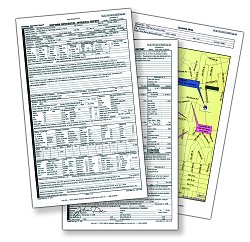
An appraisal is an opinion of value or the act or process of
estimating value. This opinion, or estimate, is derived by using the
three common approaches, all derived from the market. They
are:
The Cost Approach
to value is what it would cost to replace or reproduce the
improvements as of the date of the appraisal, less the Physical
Deterioration, the Functional Obsolescence and the Economic
Obsolescence. The remainder is added to the Land
Value.
The Sales Comparison
Approach to value makes use of other benchmark or
"comparable" properties of similar size, quality and location that
have recently sold. A comparison is made to the subject property and
adjustments are made to account for
dissimilarities.
The Income
Approach to value is of primary importance in
ascertaining the value of income producing properties, and is
generally given little weight in single-family residential
properties. This approach provides an objective estimate of what a
prudent investor would pay based upon the net or gross income the
property produces.
Then, after thorough analysis of all general and
specific data gathered from the market, a final estimate or opinion
of value is correlated. For additional information click here:
The Real Estate Appraisal
Process
Standards
Under Title XI of the
Financial Institution Reform, Recovery and Enforcement Act, the AQB
establishes the minimum education, experience and examination
requirements for state certified real property appraisers. The
Appraiser Qualifications Board (AQB) is composed of five appraisers
who are appointed for three-year terms by the Board of Trustees of
The Appraisal Foundation. States are required to
implement appraiser certification
requirements that are no less stringent
than those issued by the AQB in this Criteria. To further clarify
the intent of the Criteria, the AQB periodically issues
Interpretations of the Criteria.
Why an Appraisal?
There are many reasons why you need a real estate
appraisal. Reduce property
taxes, probate, estate planning, and
divorce settlements are some. The most common one is to obtain a
mortgage.
Appraise Before You Make An Offer?
The majority of real estate appraisals are requested by
mortgage companies to validate the property's purchase price for
loan purposes. Except for periods of very low interest rates when
everyone is refinancing, most loans are for the purchase of real
estate and ordered after a sale price is negotiated. Purchasers
mistakenly assume that mortgage companies are looking after their
interests in the purchase transaction.
Usually, individuals applying for a loan are only interested
in obtaining the loan and unfortunately are not worried about the
prudence of buying the property at the agreed price. In fact, some
purchasers will try to encourage appraisers to increase the
appraised value so that they can purchase the home regardless of its
value.
The law states that if the mortgage company orders the
appraisal, the appraiser is responsible only to the mortgage
company. We expect mortgage companies to be prudent and they should
be, but being prudent is protecting their interest, not necessarily
the purchaser's.
In
the real world, very few individuals order appraisal reports to
establish an offering price or to substantiate a purchase price. At
the point that an offer to purchase (in a typical residential
transaction) is made, the price has been set by other parties, not
the purchaser. The price has been determined by the seller, who
wishes to obtain the highest price possible, or the agent, who
receives a percentage of the price as compensation and often
represents the seller in the transaction.
The real estate agent will typically perform a comparative
market analysis (CMA). The appraisal laws in most states allow real
estate agents to perform CMAs without an appraiser's license or
certification. A CMA is a necessary part of the agent's preparation
for a listing and consists of examining sales of properties in the
area to arrive at a listing price. The reliability of the CMA
depends upon the agent's experience and the characteristics of the
property.
The Home Buyer
Checklist can help you record information
about each house you preview to help arrive at a better buying
decision.
Should YOU Skimp on the
Appraisal?
You could be throwing caution to the wind. In a changing
appraisal marketplace, financial institutions may be tempted to
skimp on appraisal services. Loosened regulations may tempt them to
throw caution to the wind, which could have dangerous consequences
for YOU.
Today, many lenders are using Automated Valuation Model (AVM) tools to replace the traditional appraisal. It's
important for borrowers to know that an AVM analysis, by itself, is
not an appraisal. The results of an AVM are intended only to help
the lender assess their risk associated with the loan.
More than ever, it's essential to for buyers and sellers to
ASK for an appraisal, especially if your closing fees include the
charge for one. Make sure you're getting what you pay
for!
| 
